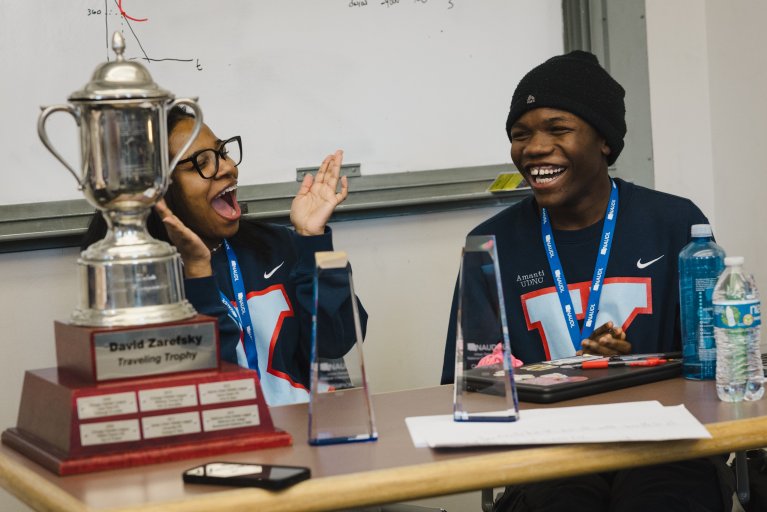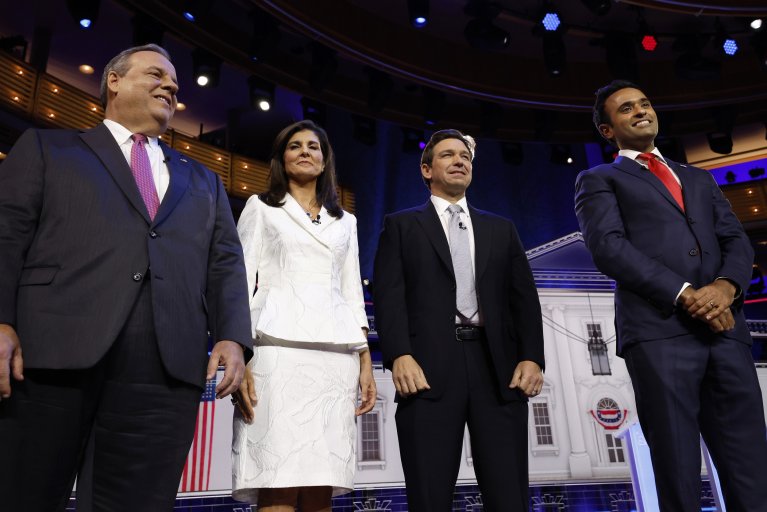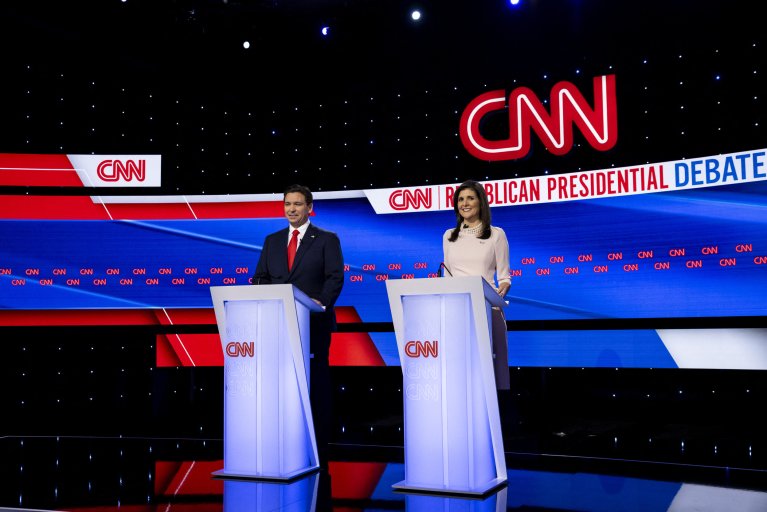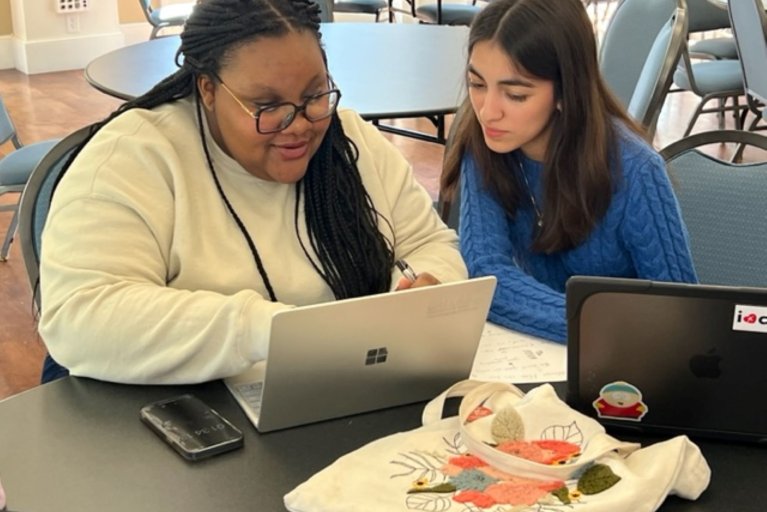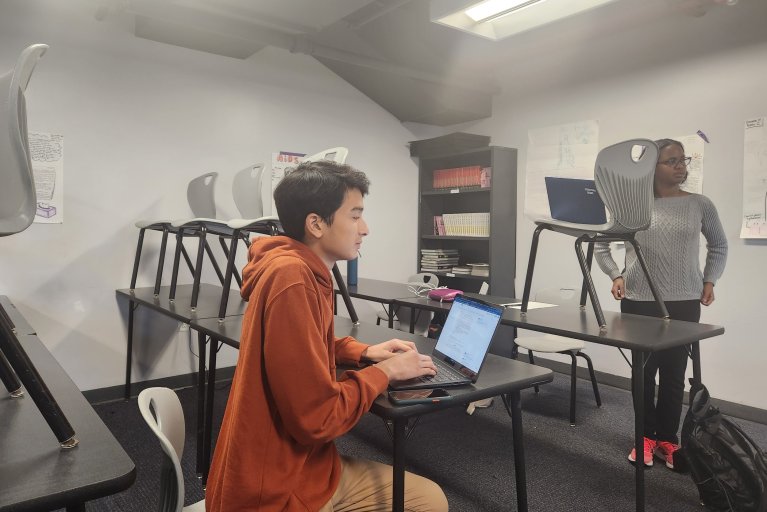May 24, 2024 At 10:53 AM EDT
With the end of the school year comes the end of another high school debate competition season. For Chloe Truong, Cristel De La Cruz, Ojas Gandhi and De'Angelo Quintero, their experience with the I RESOLVE debate series not only improved their argumentation skills, but it widened their intellectual horizons and gave them an opportunity to speak on issues that matter to them.
I RESOLVE is a public debate presented by the National Association for Urban Debate Leagues (NAUDL) in various leagues across the country each year. The event brings together high school debaters, school officials and other civic and community leaders for a discussion about some of the most pressing issues facing society.
On November 9, 2023, the Silicon Valley Urban Debate League (SVUDL) hosted its I RESOLVE with four students at the Google offices in Silicon Valley to talk about "the viability of guaranteed income as a policy solution to economic inequality," according to the SVUDL website. This topic reflects the national policy debate topic and focuses on Universal Basic Income (UBI) and reparations.
The students who presented at the event were Truong, a junior at Independence High School in San Jose who does public forum debate, and De La Cruz, a junior at Summit Everest High School in Redwood City who does World Schools debate. Gandhi, a junior at Independence High School, and Quintero, a sophomore at Andrew P. Hill High School, were also in attendance. They served as the alternates for Truong and De La Cruz and attended all of the same practices and rehearsals.
Newsweek caught up with the I RESOLVE students from SVUDL at the Urban Debate National Championship (UDNC) in Evanston, Illinois, in April. While the students were not debating at nationals, they were exploring the city of Chicago and were present at the tournament to watch the final round.

How did you get started in debate?
Truong: I wanted to join debate in middle school, primarily because I have a really big family—I'm the only girl and I have three brothers. It can get really difficult to be heard, and oftentimes, you're not taken as seriously as the middle child. I went to middle school looking for a debate team but everything with COVID was going on and so they didn't have [a team]. So in high school, I was gonna find it. When I got to Independence High School, I asked all the counselors, all the teachers, the upperclassmen I knew where the debate team was, and I found out we didn't have one. So I was like, "OK, great. How can I start one?" [The school] wouldn't let me start a club because I was a freshman, but thankfully, a sophomore started it up for us and my second semester [of freshman year], I got into it.
Gandhi: My journey in debate began in freshman year because I wanted to do something [where] I could make an impact on people as well as be able to be more confident using my voice. I had done roles in my life where I was a leader on stage—where I was narrating something or doing a play. I really like the aspect of debate in which you get to be critical with certain topics, and I really like that aspect of debate of going into a topic and really thinking critically and trying to vouch for yourself.
De La Cruz: One of my favorite movies is Legally Blonde,and [Elle Woods] is an icon, like the girl was studying polka dot history and she wanted to switch her major to become a lawyer. And I was like, "OK, that was an iconic movie." People thought she couldn't do it, but she did. I don't like to be ignorant, so when I started to learn more about the world outside, I really got interested in understanding different perspectives, points of view from different people. I am from Guatemala. I came [to the U.S.] when I was 6 years old. I was a very social child when I was over there, I loved talking to people. When I came here, it was really difficult for me to communicate with people and make friends. [Legally Blonde] really inspired me to start talking to people, and being in debate actually helped me socialize with more people. I was able to communicate my ideas and the way I thought about things more clearly.
Quintero: I started debate properly in middle school. Before that, I've always had leadership experiences [and] I've always argued with my family, so I call that pre-debate. Debate started for me in middle school when [SVUDL Director of Programming Dr. Robert Burns] went to our school and promoted it and told us about how in high school, there's already a team. About halfway through the semester, I was busy with football, and I thought [debate] would interfere with clubs for some reason. But I met with Erick Zaragoza, and me and him really hit it off. Debate, for both of us, was a way to communicate with people so that we are all less polarized. I've always had a fascination with politics and history so debate is something very essential that I truly do believe is going to be what is going to get me to any position that I may want.

What has the I RESOLVE experience been like?
Truong: Usually when we do debate, we're debating about topics that aren't necessarily personal. You're talking about these huge impacts of nuclear war that's probably never going to happen. But when I joined the I RESOLVE team, we were talking about issues that were actively impacting communities today and that my own family experiences.
Gandhi: I feel extremely lucky that I even got the opportunity. I was actually pretty excited for the topic because it's an interesting concept in terms of social welfare but also because it's also very contentious and has been discussed extensively in colleges and throughout the country, and there are a lot of polarized views. I personally did not know much about UBI, and the [few] articles I did understand, I felt a disconnect [between] the societies of people we were dealing with versus what they were proposing. So Mr. Rolland [Janairo, SVUDL executive director] and Mr. Burns recommended I go to this opening ceremony in another city that was playing a film about UBI. It [showed] me a perspective of people who are actually struggling with income and keeping their families afloat. So that was eye-opening for me.
De La Cruz: I RESOLVE really impacts me in the way that I got to speak about something I genuinely was interested in and I was able to incorporate things I learned from school. When we were talking about reparations for minorities, I picked Black people and Indigenous people because we were already on a unit in U.S. history about indigenous people. I was like, I think I should talk about if [the U.S. federal government] had to choose between universal basic income and targeting a specific group of people who have been disadvantaged by history.
How did you use your experience from debating previously to inform your arguments for I RESOLVE?
Truong: When I was getting into I RESOLVE, I was also exploring different types of critical literature. It was my first time reading works like that, and I was really trying to learn more about my community and how the Vietnam War affects immigrants all over America and how it impacted my family. That was something I was really interested in and a lot of these critical arguments are talked about in public forum and policy [debate], but the issue is never really heard by everyone because of the technical aspects. I tried to incorporate these important issues within I REOLVE to the public to try to get as many people to hear about it while I did incorporate some works from critical authors, like Bell Hooks, and convey it in a way that is applicable to the resolution we were talking about and comprehensible to a wide audience.
Gandhi: Early in the year, there was a mess with colleges in terms of how they were considering race and income into their applications. I felt like UBI and reparations played a big part into connecting these issues as well. In terms of public forum experience, I felt it was pretty similar to I RESOLVE in the fact that it also appealed to the general public. I think we all conceded that we will not be using things like uniqueness or impacts. I think we were able to be understood by the general audience and still stay within our sights in order to not only create clash but also make sure that our arguments stood out within ourselves.
Quintero: I've done policy [debate], I've done World Schools and both were valuable. I think the way both have traveled over to I RESOLVE is the critical thinking—not just for the actual I RESOLVE speech but when we covered the presidential candidates [with Newsweek], I think about the critical thinking I gained through debate. I think it really helped me traveling over into analyzing how one person interviewed or how one person debated against another, what they could have done better.

What have been some of the biggest impacts from your involvement in debate, and what are you looking forward to next year?
Truong: When I first came to high school, I would consider myself a very fearful person. I overthink a lot, I'm very cautious. When trying something new, I freak out. It's terrifying and that has been something I struggled with. But when doing debate, it taught me it's a good thing to be scared, it's good to try new things. But it also taught me how to learn how to be terrified and still do it anyways, which is really important to me. I feel like everything that I've learned from debate has been applicable to all areas of my life, even if it has nothing to do with public speaking, because I do dance and I'm in band.
Gandhi: I never actually considered debate to be that big of a part of my life before I started doing it. I didn't believe I could make that many changes in terms of public policy or maybe go out in the world and actually change the things around me. Debate gave me the confidence. It introduced me to a whole new community that was actually really empowering.
De La Cruz: Debate gave me the ability of public speaking, especially because I could speak English very well at one point. I started learning, but I was very scared of messing up in front of a lot of people. I just didn't know if it was good enough so I never really liked presentations or anything like that. When I started doing debate, I learned that presenting to people became second nature, it was really easy to do presentations. Debate gave me that skill, and now that I have that skill, I'm able to present my own ideas.
Quintero: Debate has led me to a point where I can feel confident with myself. But it's also given me opportunities to meet with people, to share new ideas, to really understand how people work. [Debate] led me to become more of a leader. This year, I had to restart the debate club. I was the sole person and then it went from one to ten, and at our height, we had like 15, 17 people. I was under a lot of pressure but it wasn't just that I got people, I was able to give them the same experience which I was able to obtain. I find that more fun and more [rewarding] than actually debating. I wish one day that I once I am gone, I can make it so that someone after me can do the same thing.

Is there anything else you want to add about your experience with debate or with I RESOLVE?
Truong: I think a really big part of this entire experience has been the mentoring that we've received. I can't even describe how impactful it's been listening to my coaches argue about an issue, watching them communicate and care about an issue or going deep into the meaning of life and why we do what we do. It's taught me so much about the way I should perceive the world and it's taught me that some things do not matter as much as I think they do. That support system that is supplementary to the activity has been equally rewarding.
De La Cruz: The fact that the coaches, how they encouraged me to go out there and share my voice. I want to do that next year, especially since next year I'm going to be the leader on the debate team. So I've tried to recruit people so I can help them build on those skills that they have.
Quintero: It's through debate that we, as young adults, have been able to take early steps into really maturing and being able to become what we can be, and debate—if you're able to join it, you should.




